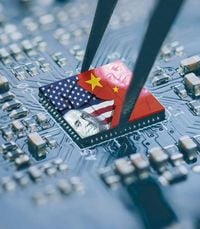The United States has intensified its efforts to curb China's technological advancements by adding dozens of entities to a trade blacklist. This action, announced by the Commerce Department on March 25, 2025, is aimed at disrupting Beijing's artificial intelligence (AI) and advanced computing capabilities. The blacklist now includes 80 entities from various countries, notably China, the United Arab Emirates, and Iran, all deemed to be engaging in activities that threaten U.S. national security and foreign policy.
Entities placed on the "entity list" are restricted from obtaining U.S. items and technologies without government authorization. Among those targeted, 11 are based in China and one in Taiwan, accused of developing advanced AI, supercomputers, and high-performance AI chips for users closely tied to the Chinese military-industrial complex. Notable organizations on the list include the Beijing Academy of Artificial Intelligence and subsidiaries of IT giant Inspur Group.
U.S. Commerce Secretary Howard Lutnick emphasized the seriousness of the situation, stating, "We will not allow adversaries to exploit American technology to bolster their own militaries and threaten American lives." The restrictions also extend to entities involved in unsafeguarded nuclear activities and ballistic missile programs, with the goal of preventing U.S. technologies from being misused for military enhancements.
Additionally, two entities in Iran and China were included in the blacklist for attempting to procure U.S. items for Iran's defense industry and drone programs. This move is part of a broader strategy to safeguard U.S. technological advancements from falling into the hands of adversaries.
In response to this blacklisting, Beijing has condemned the U.S. actions, accusing Washington of "weaponizing" trade and technology in a typical act of hegemonism. Foreign ministry spokesman Guo Jiakun stated, "We urge the US side to stop generalizing the concept of national security... and stop abusing all kinds of sanctions lists to unreasonably suppress Chinese enterprises." He further noted that China would take necessary measures to defend the rights of its firms.
Meanwhile, in a contrasting development, Apple CEO Tim Cook has been making strides to bolster the company’s presence in China, a market where it recently lost its title as the best-selling smartphone brand. On March 26, 2025, Cook visited Zhejiang University, a prominent technology hub in eastern China, where he praised the next generation of developers. In a post on Chinese social media platform Weibo, Cook expressed his excitement by saying, "Thrilled to meet the next generation of developers at Zhejiang University today."
During this visit, Apple announced a donation of 30 million yuan (approximately $4.1 million) to the university, aimed at providing students with technical and business training in app development. Zhejiang University is renowned for producing top-tier tech talent, including Liang Wenfeng, the founder of AI startup DeepSeek.
In another significant development in the tech landscape, DeepSeek, a Chinese startup, released its latest AI model, DeepSeek-V3-0324, on March 24, 2025. This new version builds on the impressive features of its predecessor, showcasing enhanced reasoning abilities, improved code handling, and better medium-to-long-form writing capabilities. DeepSeek claims that the V3-0324 model demonstrates notable improvements, achieving a score of 81.2 on the MMLU-Pro benchmark, which measures language understanding across challenging tasks.
For comparison, the previous version, DeepSeek V3, scored 75.9 on the same benchmark. Evaluations from Artificial Analysis have suggested that the new V3-0324 is now the top-performing non-reasoning model, surpassing competitors such as Gemini 2.0 Pro, Claude 3.7 Sonnet, and Llama 3.3 70B.
DeepSeek's innovations have sent ripples through the AI and tech industries, especially following its controversial training and development approaches that raised investor concerns about value for money earlier this year. In response to market feedback, DeepSeek has shifted the licensing of its latest model to an MIT license, making it more accessible.
The V3-0324 model also has the capability to run locally, which could empower edge applications. However, the announcement did not clarify whether this new version includes improved safety features, as the initial release faced criticism for inadequate safety measures.
DeepSeek is also working on the successor to its initial model, referred to as R2, which is expected to be released this Spring. Analysts at Capacity have reported that DeepSeek is fast-tracking the development of R2 following the success of its previous models, indicating that this upcoming release could represent another significant leap forward in AI technology.
As the U.S. government continues to navigate its complex relationship with China, the contrasting actions of companies like Apple and startups like DeepSeek highlight the intricate dynamics at play in the global tech landscape. With the U.S. tightening its grip on technology exports and China pushing back against perceived hegemonism, the future of international tech cooperation remains uncertain.




